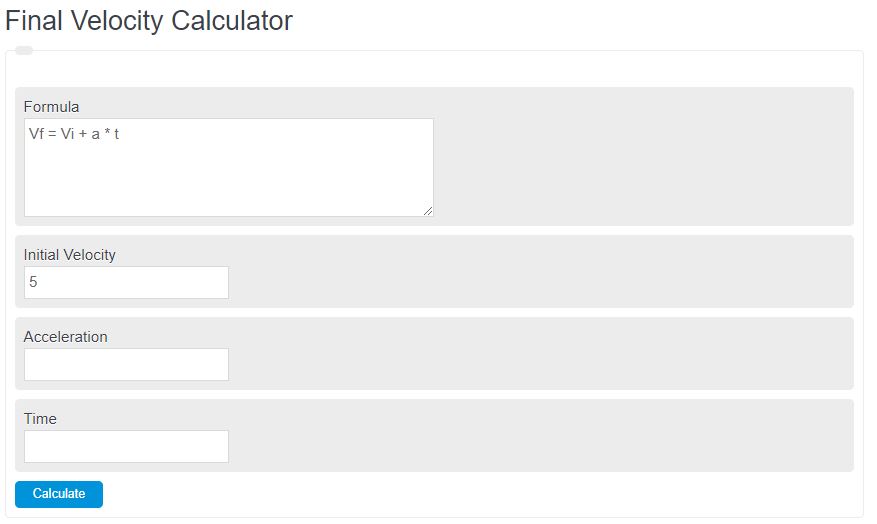Enter the initial velocity, acceleration, and total time into the calculator to determine the final velocity of an object.
- All Velocity Calculators
- Initial Velocity Calculator
- Velocity Calculator
- Terminal Velocity Calculator
- Escape Velocity Calculator
- Acceleration Calculator
- Average Velocity Calculator
- Change in Velocity Calculator
Final Velocity Formula
The following formula is used to calculate the final velocity of a moving object.
Vf = Vi + a * t
- Where Vf is the final velocity
- Vi is the initial velocity
- a is the acceleration
- t is the time
To calculate the final velocity, multiply the acceleration by time, then add the initial velocity.
Typical units for these values are m/s for velocity, m/s2 for acceleration, and seconds for time. With that said, other values can be used as long as they match up. For example, m/s could be ft/s as long as acceleration is then ft/s^2.
Final Velocity Definition
A final velocity is defined as the final speed of a moving object with an initial velocity and acceleration over some time.
Final Velocity Example
How to calculate final velocity?
First, determine the initial velocity. For this example, problem, the initial velocity is measured to be 50 m/s.
Next, determine the acceleration. During the duration of the movement, this object accelerates at a are of 5m/s^2.
Next, determine the total time of acceleration. The object in this example accelerated for a total time of 5 seconds.
Finally, calculate the final velocity using the formula above:
Vf = Vi + a * t
Vf = 50 + 5 * 5
Vf = 75 m/s.
FAQ
A final velocity is a speed at which an object is moving after having gone through an acceleration over some time.
Finally, velocity is calculated by adding the acceleration times time to the initial velocity.
How to calculate final velocity?
- First, determine the initial velocity.
Measure the initial velocity.
- Next, determine the acceleration.
Calculate the total acceleration.
- Next, determine the time.
Measure the total time.
- Finally, calculate the final velocity.
Calculate the final velocity using the formula above.

